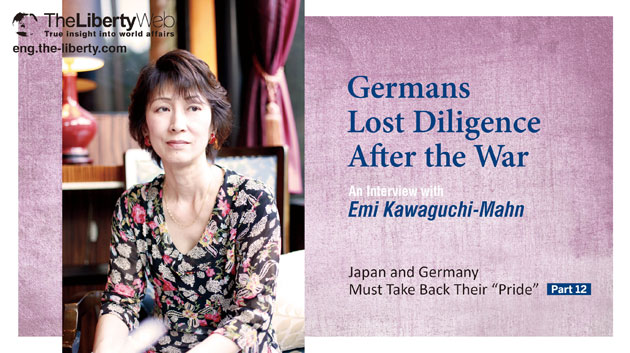Germans Lost Diligence After the War
An Interview with Emi Kawaguchi-Mahn
How do Germans’ sentiments appear to the Japanese? We talked to Emi Kawaguchi-Mahn, an author living in Stuttgart, Germany with her German husband and daughters.

Emi Kawaguchi-Mahn
Born in Osaka in 1956. After graduating from the Art Department of Japan University, attended graduate school at Germany’s State University of Music and Performing Arts Stuttgart. Finished piano studies in 1985, and married a German, Eberhard Mahn. Mother to three daughters. Her numerous works include, “Sunde mita Doitsu 8-sho 2-pai de Nihon no kachi” (Kodansha), “Sabisu deki nai Doitsu jin, Shuchou deki nai Nihonjin” (Soshisha), etc.
Many Germans feel “what terrible things we had done” concerning the Holocaust. They’re completely sincere about this. However, it was so terrible that it doesn’t tie in personally. They probably don’t think that, “if I was born then, I might’ve done the same thing.”
So, when German politicians offer flowers at memorials in other countries or give apologies, they probably feel somewhat removed in their apology.
And their apology, the official apology with compensation, is for the holocaust. For the war crimes, they may express regret, but instead of compensation they give economic support.
Germans Became Left-Wing
The post-war governance was influenced largely by America, I think.
After the war, the German military was retired. They returned with the Cold War, and during the 1970s nuclear weapons were stationed in Germany, but they remain strongly allergic to militarism. The use of force during deployment of troops to Afghanistan split opinions, and when there used to be military service, most of the boys in my daughter’s class wrote reports in order to decline military service.
Germany amended the Constitution numerous times. Their economic strength has gone up, and their confidence as a nation has been returning, but I think there are many Germans who feel that they’ve lost many valuable things since the war. Germans have a strong image of being earnest and diligent. However, Germans today do not run trains properly and there are many people who love to take days off and are rather carefree.
I think education after the war is one of the causes. They have become too liberal. Due to the reaction to the Nazis and other things, there was even a time when people questioned whether a teacher lecturing from a podium was coercive or not. Those who were left-winged during the student revolution during the 70s still hold power today, and the education and media are left leaning. It’s similar to Japan, but I feel that the level of liberalism is stronger in Germany.
Ought to Encourage Foreigners Who Love Japan
Today, Germany keeps a good relationship with France whom they were unfriendly with before. Within the efforts started after the Elysee Treaty in 1963, the exchanges between the youth is what I really think is great. When unprejudiced children have exchanges, 10~20 years into the future, their hatred would be diminished.
China and Korea tell Japan to learn after Germany. But there are no nations around Germany too who teach “not to forget hatred.”
I think Japan should take initiatives in trying to increase foreigners who like Japan. Japan is a gentle, good country. For instance, you order a hamburger at a restaurant and they bring an omelet. In Japan it is normal to say, “Sorry, I ordered a hamburger.” However in Germany they might even talk back saying, “No, you ordered a steak”. I can not get used to that aggressive custom, no matter how many years go by。
The service industry is really well developed in Japan. I think that is because everyone understands that the essence of service is to make others feel good. So when Germans come to Japan, they are very moved, and they fall in love with Japan. All of my acquaintances are like that.
If they knew of Japan this way, then even if the media or others say negative things about Japan, they might think, “I wonder if Japan would actually carry out the Nanking Massacre.?
(The end of interview)
Both Japan and Germany Do Not Have to Apologize
Japan did not engage in war of aggression, much less the “holocaust”. Japan is asked to apologize like Germany, but Japan does not have to apologize.
Should Germany continue to apologize?
Today, Germany is the number 4 economic superpower in the world, and number 1 in the EU. They are in a position to lead an EU that is fraught with challenges. The situation in which Germans still find themselves with continuing trepidation over the crimes of the Nazis, discourages their ability to be confident or have pride, and only prolongs the EU’s stagnation.
After the war, Germans were seen as “guilty”, but new generations have replaced the old. Of course the crimes of the Nazis were heavy, but they ought not drag on forever for the crimes of Hitler. They will never be forgotten, but it is time that. Germany’s crimes are forgiven so their people can move on with their emotional healing, as they have economically, and as a world leader. The time is now.
It is almost 70 years since the war ended. The time has come for Japan and Germany to regain their national pride.
Related
- What About Germany and Japan Was Deemed to Be "Guilty"?:Japan and Germany must take back their Pride" (Part 7)
- Germans Want Japan to Continue to Be as Guilty as They Are……:Japan and Germany must take back their "Pride" (Part 8)
- Germany's and Japan's Wars Are Essentially Different:Japan and Germany must take back their Pride" (Part 9)
- How and for What Did Germany and Japan Apologize?:Japan and Germany Must Take Back Their "Pride" Part 10
- "Germans Are Unable to Express Their Patriotism":An Interview with Professor Ernst Nolte



















